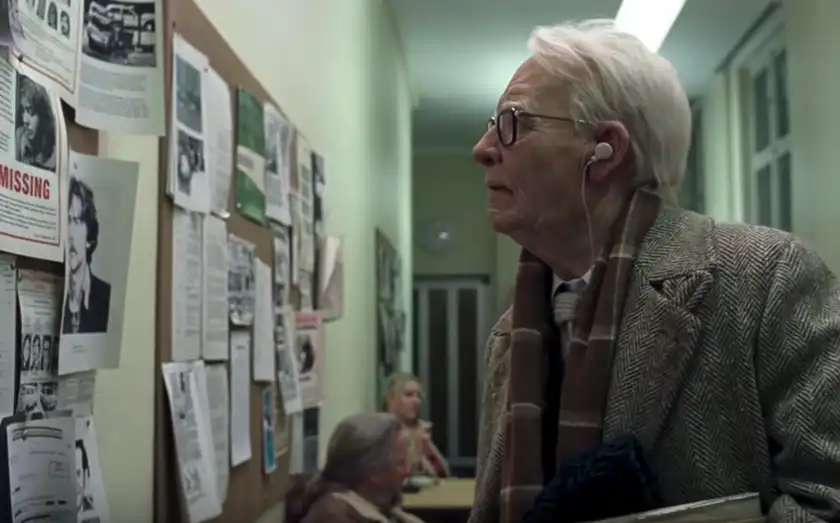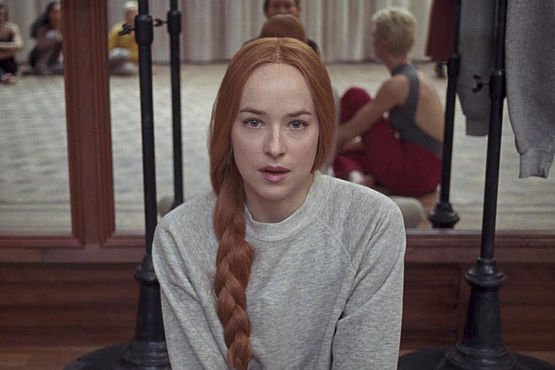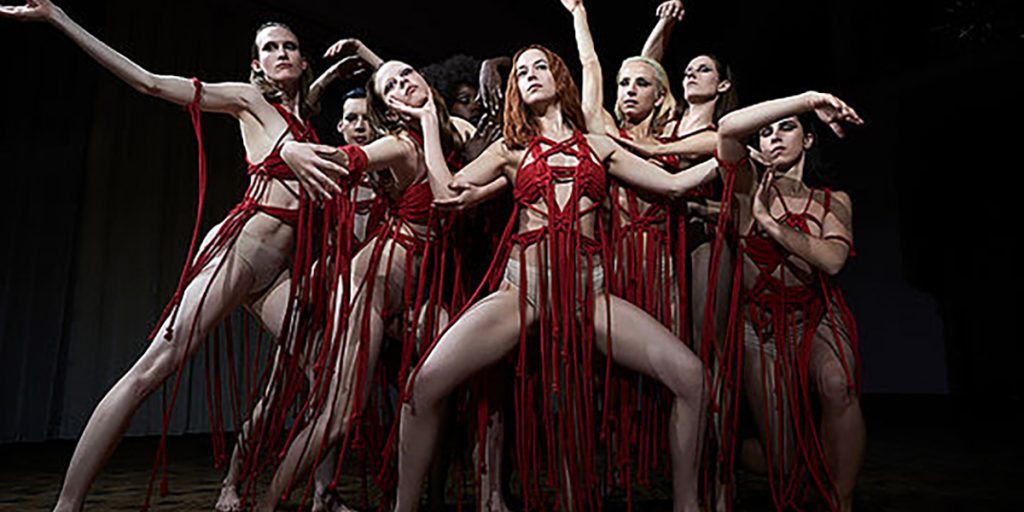Tilda Swinton and Dakota Johnson shine in Luca Guadagnino’s Suspiria (2018), a stunning Dario Argento remake and a clever analysis of human nature.
On the day of Suspiria‘s world premiere at the 75th Venice International Film Festival, the press conference for Luca Guadagnino’s (Bones And All) remake kicked off with an apology. Said apology came in the form of a three-sheet long letter addressed “to the esteemed ladies and gentlemen of the press” that appeared to have been written by Lutz Ebersdorf, the 82 years old actor credited for playing therapist Jozef Klemperer in the film. The letter – that is, the actor’s apology for not being able to make it to the premiere – was surprisingly met with a mix of puzzled looks and stifled giggles.
The unusual reaction wasn’t just due to the aplomb with which Tilda Swinton read the letter, in which Ebersdorf described himself as “a private individual who prefers to remain private”, or the odd choice of subjects the actor chose to talk about – as he explained that he was chosen for the part because “the audience would enjoy to see a new face”, revealing his suspicion that Suspiria might be the only film he would ever appear in and finally urging any viewers “disturbed by this film to seek a good therapist”. The audience’s reaction came from the fact that Lutz Ebersdorf doesn’t exist.
But it was more complicated than that. We had just come from the press screening of the film, which was the very first time Suspiria was shown to a large audience at the festival. We had done all the research to prepare for the press conference, and our minds were full of questions. Why did Guadagnino choose to set his film in Berlin? Why did he choose to make so many changes from Dario Argento’s original Suspiria? Who was the exceptional actor who played the therapist? And, most of all… Didn’t he look a little familiar? …Yes, he did.
Even though director, cast and crew kept denying it at the press conference and even though Mr Ebersdorf even appeared to be regularly listed on IMDb, the immensely talented actor who played Doctor Klemperer had been the incredible Tilda Swinton all along. And the actress’s ironic and mysterious way to start the press conference with what was, in a way, a “private joke” with the audience was the perfect way to introduce Luca Guadagnino’s clever, ironic and at times even provocative film.

Suspiria revolves around American dancer Susie (Dakota Johnson, of Bad Times at the El Royale), who happens to audition at world-renowed Helena Markos Dance Company on the very same day that the role of the lead dancer has become available, due to the previous lead’s (Olga, played by Elena Fokina) sudden breakdown. Susie has chosen that company because she has always admired the choreographer, Madame Blanc (Tilda Swinton), who also witnesses her audition and decides to make her the new lead.
Each new day at Helena Markos unfolds new secrets on the “Mothers” who run the company, who had been accused by Olga of being witches. As new mysteries emerge, Susie’s close relationship with her enigmatic mentor Madame Blanc takes a turn for the weird. When one of the dancers (Patricia, played by Chloë Grace Moretz) disappears, her psychotherapist, Doctor Klemperer (Swinton) contacts another dancer (Sara, played by Infinity Pool‘s Mia Goth). Sara’s investigations trigger a series of events that shed light on the Mothers’ terrible secret, but there’s a high price to pay for these discoveries.
2018 Suspiria has very little to do with Dario Argento’s original classic (1977), and I’m not just talking about the lack of gory scenes and different choice of soundtrack. Guadagnino’s remake is eerie, unsettling and intense, but it’s also exquisitely delicate, atmospheric and intimate. From its slow narrative to its repetitive dance routines, from its characters’ background to the relationships they form with each other, every single detail adds a new layer of meaning to the film’s powerful message.
The most important detail of all is the writers’ choice to set the film in 1970s Germany. Guadagnino’s Suspiria is strongly rooted in its context, and Berlin is a constant presence that never fails to remind us where the action is taking place. The political subtext is there, from the Nazi references and news on the radio to the “six acts and an epilogue, set in divided Berlin” title card that appears at the very beginning of the film. The visual reminders have been planned to perfection, so much that we can even spot a David Bowie poster in a dancer’s room. In fact, the references never seem to end. As the Mothers’ obsession with Susie’s final performance of “Volk” grows out of control, so does the rest of the film. The rehearsals are frantic, the music is even more hypnotic and the setting becomes claustrophobic – like a character of its own who can’t seem to leave us alone.

As the film slowly picks up the pace, so do its surprisingly multi-faceted, complex characters. Dakota Johnson‘s superb portrayal of Susie gives us a leading character who is believable, relentless and anything but predictable. Susie might be new to the school, but she is not the insecure and fragile person we would expect to see. Our protagonist is a smart, independent, believable character who has our attention from the very first moment we see her.
Susie’s growth is at the very core of Guadagnino’s story, and so is her relationship with Madame Blanc and the rest of the “Helena Markos” dysfunctional family. The film deals with the evolution of the mother(s)-daughter relationship, and the Dance Company provides the perfect environment to explore it. The dynamics are generational, as both Mothers and students are involved, but there’s a psychological element too, as we deal with groups that become entities that can own and take control of an individual’s whole identity.
There are feminist elements and there’s political commentary; there’s a psychological analysis and there are powerful social dynamics. But there is even more than that. Guadagnino took inspiration from Rainer Fassbinder to use colurs to evoke fear, while co-writer David Kajganich used a quote from Joseph Goebbels (“Dance must be beautiful and cheerful and in no way philosophical”) to revolutionise the way dancing should be seen. He looked for performances that were “neither cheerful nor beautiful” and created a whole new kind of movement to evoke a mystical atmosphere.
The mystical element is key in defining the other leading character of this film – Madame Blanc. Based on German choreographer Philippina “Pina” Bausch (who also happens to be Suspiria‘s choreographer Damien Jalet’s mother) but also on renowned dancers such as Martha Graham and Mary Whitman, Tilda Swinton’s Madame Blanc is both fascinating and terrifying. She is the most empathic character in the film, but she is also the one we can’t decide what to think of. Her unhealthy connection with Susie is invasive and controlling, and the added supernatural element cleverly brings religion into play too.
Suspiria is essentially about a group of witches, so the supernatural element was bound to appear, but the idea of adding religious references was pure genius. Kajganich spoke about wanting to “modernise” Argento’s film, and there could have been no better way to do it than by subtly connecting the mystical element to something that is not only rooted in our culture, but that we all have an opinion on. From the moment Madame Blanc questions Susie on her childhood in Ohio and asked her whether her severe religious family “punished her” for her misbehaviour, the idea of sin is in our head. When Doctor Klemperer, perhaps the only person in this movie who is essentially good and innocent, tries to rationalise Patricia’s obsession with witches, he calls religion a “delusion” that can be given to someone and even goes so far as to compare it to the Third “Reich”. All this brilliantly weaves yet another layer into Suspiria‘s complex, clever narrative, making the film all the more fascinating.
Guadagnino’s Suspiria is a complex film. It’s a psychological thriller with supernatural elements, but it’s ultimately about human nature. It’s a journey of obsession, delusion and self-discovery that handles serious issues with great irony and intelligence. It explores the deepest parts of a person’s soul and brings out the very worst. It’s about finding out who you are when you are taken out of the group and you have to take responsibility for the choices you make. It’s about accepting the ugliest parts of yourself, even if it means being alone. It raises questions on good and evil and even questions our perceptions of memory and reality.
And, although it does provide us with some of the answers, they’re not nearly as many as we’d hoped for. Suspiria lets us decide what message we want to remember. Most of all, it reminds us that we all carry our own demons with us, but it’s up to us to decide what choice to make.
Suspiria premiered at the Venice Film Festival, and is now available to watch on Prime Video.

